|
|
|
Sort Order |
|
|
|
Items / Page
|
|
|
|
|
|
|
| Srl | Item |
| 1 |
ID:
160043


|
|
|
|
|
| Summary/Abstract |
While most literature on the 2011 Egyptian Revolution chants highlights the revolutionary role of poetry, little attention has been paid to the role that theology plays within this domain. This article argues that reading Abu al-Qassim al-Shabbi’s poem, ‘Life’s Will’ (1933), which inspired the chant for the fall of the regime, through the lens of Charles Taylor’s A Secular Age (2007) sheds light on the political relevance of the theological theme within this poem. The essay re-reads al-Shabbi’s investment in the Islamic muʿtāzilī doctrine of free will in terms of the creative role that Taylor gives to romantic poetry in creating a community’s ‘moral order’. Such an analysis brings to light the contribution that a comparative theological-literary framework can have to the political deliberation on the Arab Spring revolutions, especially the 2011 Egyptian Revolution.
|
|
|
|
|
|
|
|
|
|
|
|
|
|
|
|
| 2 |
ID:
160036
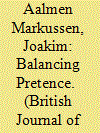

|
|
|
|
|
| Summary/Abstract |
King Hussein of Jordan was often at odds with his less conciliatory counterparts in the Arab world. He was one of the few Arab leaders who engaged and communicated with Israel. The administration of US President Lyndon B. Johnson wanted to ensure the continuation of Hussein’s moderate line towards Israel and sold weapons to Jordan. However, providing military support to an Arab state when the vast majority of Americans favoured Israel involved significant political costs. As the Johnson administration saw it, openly favouring only Israel would negatively affect the USA’s position and interests in the Arab world. Therefore, Johnson pursued a policy of seemingly balancing Israeli and Jordanian interests. This article argues that the USA supported Jordan primarily to ensure Israel’s security, but ultimately, the Johnson administration lacked the will and understanding to properly address Jordan’s concerns and failed to prevent King Hussein from joining the Arab side of the 1967 War against Israel.
|
|
|
|
|
|
|
|
|
|
|
|
|
|
|
|
| 3 |
ID:
160038


|
|
|
|
|
| Summary/Abstract |
This article studies materials published in the Bonyad Monthly, a journal sponsored by the Pahlavi state. It was published for two years (1977–78), just prior to the 1979 Revolution in Iran. Bonyad Monthly’s mission was to engage in the ongoing intellectual debates at the time in Iran’s encounter with modernity. It primarily published articles, interviews and translations, with the aim of exposing the cultural and moral perils of modern western culture. The writers of Bonyad Monthly cast the modern world as morally soulless, culturally debased, politically imperial and arrogant. The Journal also depicted Iranian culture as the mirror image of the modern west, and part of the rising “Eastern spiritual” resurrection. More specifically, Bonyad Monthly helped invert and de-politicize the notion of Gharbzadegi (Westoxification).
|
|
|
|
|
|
|
|
|
|
|
|
|
|
|
|
| 4 |
ID:
160046
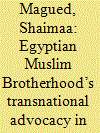

|
|
|
|
|
| Summary/Abstract |
This study examines the Egyptian Muslim Brotherhood’s transnational media advocacy as a shift in the Islamists’ political participation in general and the Brothers’ in particular. The article argues that the Brothers created their own TV channels in order to challenge the new regime’s legitimacy after 3 July 2013 by taking advantage of a sympathetic political environment in Turkey. Their media advocacy embraced a collective Islamic identity in its denunciation of the Sisi regime and called for a democratic restitution as a common Egyptian cause. Based on interviews conducted with TV presenters and a content analysis of the expatriates’ TV channels, this study presents transnational advocacy as a novelty in the Islamists’ repertoire of action.
|
|
|
|
|
|
|
|
|
|
|
|
|
|
|
|
| 5 |
ID:
160042
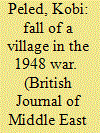

|
|
|
|
|
| Summary/Abstract |
The present paper attempts to take a close look at the events surrounding the conquest of the Palestinian village of Mi’ilya in the 1948 war based on Hebrew-language documents in the Israel Defense Forces archive and interviews conducted in Arabic with elderly people living in Mi’ilya. Its aim is to explore how these two types of sources and the distinct cultures of remembrance which they represent may be combined to produce a new historical canvas, affording a broader and deeper picture than could be achieved based on the Israeli archive alone or on Palestinian memories alone. Our main concern has been to reconstruct the past, a task that has become particularly urgent as regards oral memories of the war. At the same time we seek to show how present-day cares weigh on our recollections of the past and affect their form.
|
|
|
|
|
|
|
|
|
|
|
|
|
|
|
|
| 6 |
ID:
160040


|
|
|
|
|
| Summary/Abstract |
It was during the reigns of the late-eighteenth-century rulers of Mysore, Haidar ‘Ali (r.1761–82) and Tipu Sultan (r.1782–99), that one of the earliest efforts of semi-modernization in the regions of West, Central and South Asia, as well as North Africa was taking place. Some scholars have described Haidar and Tipu as premodern rulers, but continuity and tradition do not fully explain Mysore’s transitional character, which was embodied in these rulers’ reforms. Their encounter with European powers convinced and compelled them that a transformation of state and society was the most promising means to resist colonization and remain independent. The following will inquire into Mysore’s late-eighteenth-century foreign relations and recruitment of foreign artisans. It will be intended to assert that neither can these efforts be exclusively understood in terms of tradition nor do they reflect the minds of modern rulers. Instead, they manifest a historical juncture that was neither dominantly traditional nor modern, but resided in a transitory phase.
|
|
|
|
|
|
|
|
|
|
|
|
|
|
|
|
| 7 |
ID:
160044


|
|
|
|
|
| Summary/Abstract |
Previously unexamined material from two archives of the Greek (Rum) Orthodox community in Jerusalem shed new light on our understanding of the dynamic of an important segment of the city during the transition period between the Ottoman Empire and the British Mandate eras. We use these unexplored records to question communal affiliations, transitions of identity, the impact of modernity as well as notions of sacred space. We offer unique insight regarding the Christian Orthodox denomination in the city by examining its two main sub-communities, Palestinians and Greeks, and exploring the connection between the community and the city. We argue that the proximity to the holy sites bears little impact on private Christian life. We trace the impact of modernity through the change of professions and argue that the most important divide in the community was not between the ethnic groups but between the older and younger generations. Naming patterns (prosopography) disclose other influences of modernity. We contend that a seemingly minor change in naming patterns is indicative of two important processes: the secularization of the community and rising Palestinian nationality.
|
|
|
|
|
|
|
|
|
|
|
|
|
|
|
|
| 8 |
ID:
160039


|
|
|
|
|
| Summary/Abstract |
This article has three interrelated objectives: firstly, it challenges monolithic depictions of the 2013 Gezi protests and conceptualizes the so-called ‘Spirit of Gezi’ as a highly influential—albeit temporary—power in the politics of Turkey. Secondly, it traces the success of the HDP (Peoples’ Democratic Party) in the 7 June 2015 parliamentary election back to Gezi while acknowledging the roots of the party within the Kurdish political movement. Thirdly, it examines the manifestation and subsequent decline of what is termed the human security moment in Turkey. The arguments of the work are mostly based on interviews with Gezi activists. It is argued that Gezi produced a discursive challenge to the national security-oriented understanding of the ‘Kurdish question’. Yet, even though the human security-oriented Gezi discourse had brought the Kurdish political movement and the Turkish left together, it ultimately failed to permanently transform Turkish politics due to the collapse of the peace process in June 2015. In addition to contributing to the literature on Gezi, the article also draws insights for security studies. It concludes that alternative discourses to the state-centric securitization approach to conflicts such as the Kurdish question can only have a lasting effect under conditions of ceasefire.
|
|
|
|
|
|
|
|
|
|
|
|
|
|
|
|
| 9 |
ID:
160047


|
|
|
|
|
| Summary/Abstract |
In August 2014, for the first time in the history of the Turkish Republic, the president was elected through a popular vote. The quest for a new constitution and revisions to the political system were the main topics that the three presidential candidates, Recep Tayyip Erdogan, Ekmeleddin Ihsanoglu and Selahattin Demirtas, raised during their presidential campaigns. Women’s problems and issues were among the central topics through which the matters of the new constitution and the revisions to be made in the system were addressed. Through a qualitative content analysis of the campaign material, this article maps the candidates’ approaches to women’s interests and the roles the candidates promised to play to promote these interests and roles. The findings indicate that motherhood, daughterhood and sisterhood are the key terms through which the candidates formulated the ultimate purpose of their gender-related agenda. They simply blamed the existing constitution as the main cause of alienated motherhood, polarized daughterhood and complicit femininity respectively. Based on the analysis of these simultaneous calls for heightening-disavowal of certain femininities, the article argues that competing projects for the (re)establishment of the constitutional regime in Turkey can be construed as renegotiations of feminine attachments to political authority.
|
|
|
|
|
|
|
|
|
|
|
|
|
|
|
|
| 10 |
ID:
160045
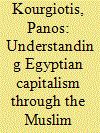

|
|
|
|
|
| Summary/Abstract |
The following article addresses the intricate issue of contemporary Islamist thought’s relation to the modern capitalist economy, with special reference to the Egyptian case. Islamist thinkers have been vigorously proclaiming for the past decades that the economic prosperity of some Muslim nations stems from the proper adoption of an ‘Islamic economy’, whereas the absence of such a model has been mainly responsible for the crises that other nations faced. At the same time, we witness that the Muslim nations are fully integrated into the global market system. Although their rulers boast about achieving social justice, by economically interpreting Islam, nonetheless poverty and horrific injustices are officially retained and morally accepted, thus, enabling the upper classes to keep performing their pious duties in the name of God. In this regard, it seems that capitalism and piety are intertwined: the first justifies the necessity of the second, while the second humanizes the brutal impact of the first. By referring to the historical example of the Muslim Brothers in pre-socialist Egypt, the article tends to show under which circumstances was capitalism’s relation to religious piety conceptualized in Islamist thought and literature, in addition to the main social, organizational and ideological outcomes of this conceptualization.
|
|
|
|
|
|
|
|
|
|
|
|
|
|
|
|
| 11 |
ID:
160037
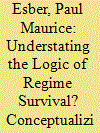

|
|
|
|
|
| Summary/Abstract |
Both reform and revolutionary movements in the Arab world have called on institutions of state to follow through on the cries for dignity, bread and social justice emanating from the street. These movements are not necessarily mutually exclusive, and may demonstrate overlapping commonalities of practice. Asef Bayat has designated this phenomenon an example of ‘refo-lution’, the amalgamation of a revolutionary agenda with a reform process. This paper will argue that 2011/2012 demonstrations in Jordan fall into this category, and that they elucidate that the relationship between the Hashemite monarchy and Jordanian society needs to be reframed for political stability. The theoretical frame of this article, grounded in the selectorate theory of Bruce Bueno de Mesquita in conjunction with insights from Nazih Ayubi, suggests that this stability requires a more defined separation of powers and functions of the monarchy and the parliament, making the latter an autonomous legislative body.
|
|
|
|
|
|
|
|
|
|
|
|
|
|
|
|
|
|
|
|
|